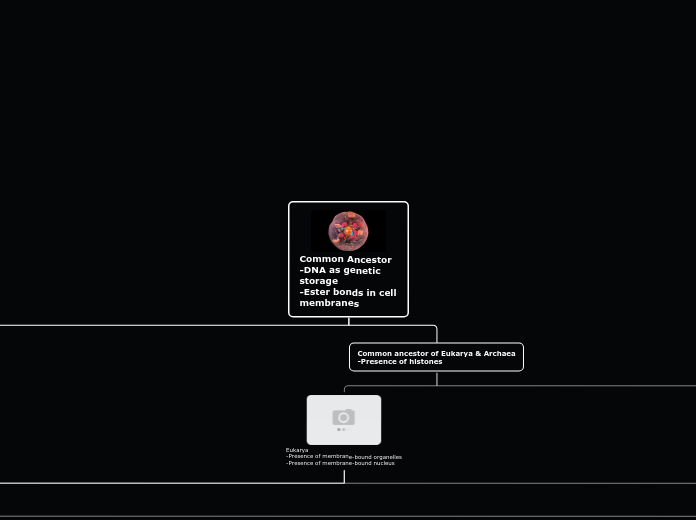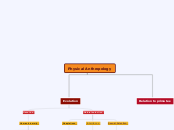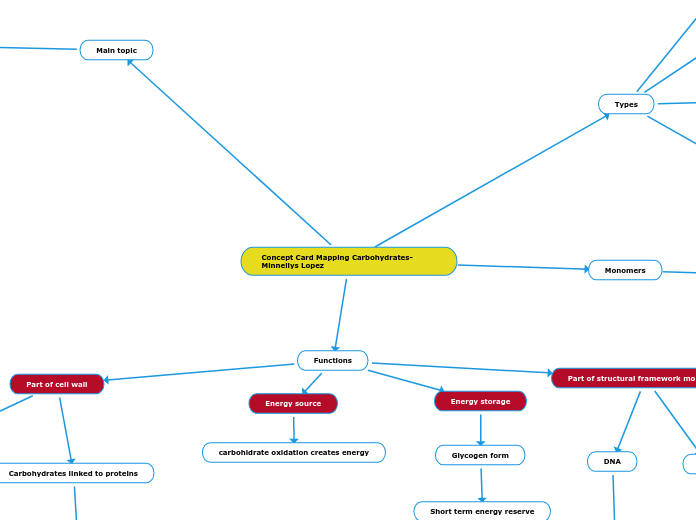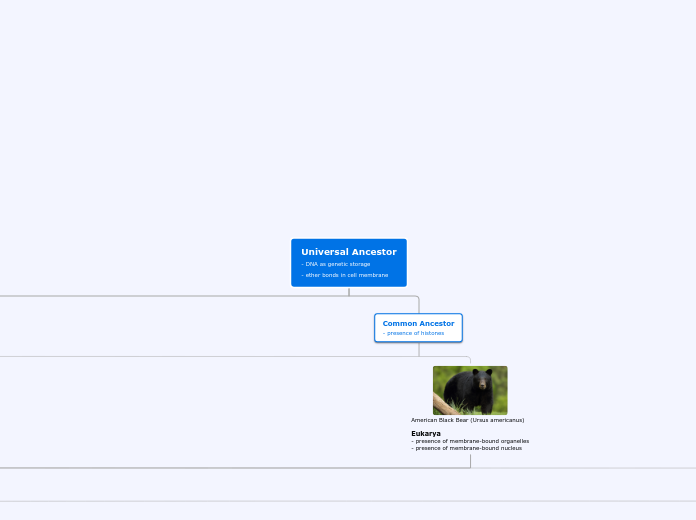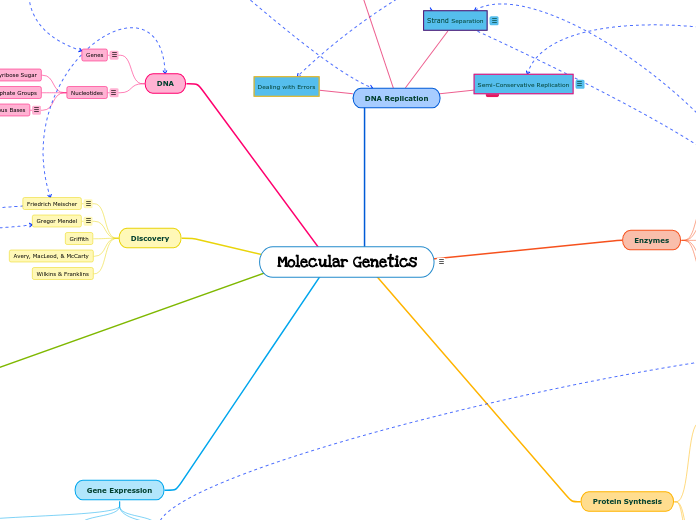Common Ancestor
-DNA as genetic storage
-Ester bonds in cell membranes
Common ancestor of Eukarya & Archaea
-Presence of histones
Archaea
-Ether bonds in cell membranes (derived from esther bonds)
Eukarya
-Presence of membrane-bound organelles
-Presence of membrane-bound nucleus
Unikonta
Opisthokonta
-single posterior flagellum on swimming cells
Common Ancestor of Choanoflagellate and Animals
Choanoflagellates
Animals
American Black Bear (Ursus americanus)
-multicellularity
-absorptive heterotrophy
-mobility
-complex organ systems
-gametic life cycle
Eumetazoa
-Tissue
-Symmetry
Cnidaria
-radial symmetry
-diploblasty
Anthozoa
-usually only polyp
Medusozoa
Scyphozoa
-usually only medusa
Hydrozoa
-alternates between polyp & medusa
Bilateria
-triploblasty
-bilateral symmetry
-cephalization
Protostomia
-spiral & determinate cleavage
-blastopore becomes mouth
Ecdysozoa
-ecdysis
-metamorphosis (most)
Nematoda
-round worms
-free-living & parasitic
-cuticle
-pseudocoelom
-complete digestive tract
Arthropoda
-"jointed foot"
-segmented
-exoskeleton made of chitin
-complete digestive tract
-open circulatory system
Chelicerates
-cephalothorax & abdomen
-4 paris of walking legs, pedipalps, chelicerae
Pancrustaceans
Hexapoda
-six legs
-insects
-many have wings (crucial to their success as a group)
-head, thorax, abdomen
Crustaceans
-cephalothorax
Lophotrochozoa
-lophophore and/or trocophore larvae
Common ancestor of Mollusca & Annelids
Mollusca
-soft-bodied
-foot, visceral mass, mantle
-coelomates
-organ systems
Bivalvia
-2 part shell
Cephalopoda
-reduced or absent shell (except nautilus)
-closed circulatory system
Gastropoda
Annelida
-segmented worms
-closed circulator system
-complete digestive tract
Platyhelminthes
-acoelomates
-incomplete digestive tract
-no respiratory or circulatory systems
Tapeworms (cestoda)
-parasitic
-no digestive tract
Trematodes
-parasitic
Free-living Rhabditophorans
Deuterostomia
-radial & indeterminate cleavage
Echinodermata
-"spiny skin"
-water vascular system
-adults radially symmetrical, larvae are bilaterally
symmetrical
-no brain
-complete digestive tract
Asteroidea
-sea stars
Echinoidea
-sea urchins & sand dollars
Ophiuroidea
-brittle stars
Holothuroidea
-sea cucumbers
Chordata
-notochord
-dosal nerve cord
-pharyngeal slits
-endostyle
Cephalochordata
Common ancestor of vertebrates & urochordates
Urochordata
Vertebrates
-cranium
-vertebral column
Agnathans (Cyclostome)
Myxini (hagfish)
Petromyzontida (lampreys)
Gnathostomes
-jaws
-bony skeleton
Osteichthyes (bony fishes)
-lungs/lung derivatives
Lobe-finned fishes (Sarcopterygii)
-skeleton extends into the fin
Coelocanths
Common ancestor of lungfishes & tetrapods
Lungfishes
Tetrapods
-4 limbs with digits
Amniotes
-amniotic egg
Reptiles
-ectotherm
Archosaurs
Common ancestor of birds & crocodilians
Crocodilians
Birds (Aves)
Turtles
Lepidosaurs (snakes, lizards, amphisbaenians)
Mammals
-hair
-milk
-endotherm
Monotremes
-egg-laying mammals
Common ancestor of Marsupials & Eutherians
Marsupials
Eutherians
Amphibians
-non-amniotic egg
Ray-finned fishes (Actinopterygil)
Chondrichthyes
-bony skeleton lost
-cartilaginous skeleton in extant species
Porifera
-Asymmetry
-No tissues
Fungi
-multicellularity
-absorptive heterotrophy
-cell wall
-zygotic life cycle
Black Bread Mold (>Rhizopus stolonifer)
Fly Agaric (Amanita muscaria)
Amebozoa
-movement with pseudopodia
slime molds
Archaeplastida
-primary plastids
Common ancestor of chlorophytes, charophytes, and lan plants
-cell walls made of cellulose
-chlorophyll a & b and b-carotene
Chlorophytes (Green Algae)
Common ancestor of charophytes and land plants
-ring-shaped cellulose-synthesizing proteins
-phramgoplast
Charophytes (Braun's stonewort (Chara braunii))
-zygotic life cycle
Southern Magnolia (Magnolia grandiflora)
-common ancestor of land plants
-Sporic life cycle
-embryo
-desiccation-resistant spores
-apical meristems
-gametangia
-sporangia
Common Liverwort (Marchantia polymorpha)
Common ancestor of Mosses, Hornworts, Lycophytes, Monilophytes, Gymnosperms, Angiosperms
Woolly Feather Moss (Tomentypnum nitens)
Common ancestor of Hornworts, Lycophytes, Monilophytes, Gymnosperms, Angiosperms
Field hornwort (Anthoceros agrestis)
Common ancestor of Lycophytes and Monilophytes, Gymnosperms, and Angiosperms
-Lignin
-Xylem & Phloem
-Leaves
-Dominant sporophytes generation
-Thick waxy cuticle
-Stomata
Fan clubmoss (Diphasiastrum digitatum)
-Lycophytes
Common ancestor of Monilophytes, Gymnosperms, Angiosperms
-Megaphylls
Eastern Marsh Fern (Thelypteris palustris)
-Monilophytes
Common ancestor of Gymnosperms and Angiosperms
-pollen
-seed
-heterospory
-wood
-ovules
Angiosperms
-"enclosed seeds"
-fruit
-endosperm
-ovaries
White Water Lily (Nymphaea alba)
Southern Magnolia (Magnolia grandiflora)
Gymnosperms
-"naked seeds"
Bald Cypress (Taxodium distichum)
Scots Pine (Pinus sylvestris)
rhodophytes (Red Algae)
SAR clade
Rhizaria
-filose pseudopodia
Foraminiferas
Radiolarians
Alveolata
-membranous vesicles on cell membrane
-secondary plastids but dinoflagellates can tertiary plastids
Stramenopila
-Tripartite flagellar hair
-Secondary plastids
Giant Kelp (Macrocystis pyrifera)
Diatoms
Excavata
-Feeding groove
-Secondary Plastids
Bacteria
-Presence of peptidoglycan in cell wall
